US campaign rhetoric reveals strategies
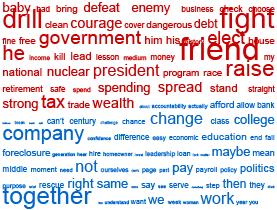
Zurich University researchers have studied more than a million words used by Barack Obama and John McCain to see how they use language to put across their message.
Historian Martin Klimke, who is based at the German Historical Institute in Washington and analysed the results, tells swissinfo that McCain is very concise and clear while Obama is consistent and draws links between issues.
Working with linguists Noah Bubenhofer and Joachim Scharloth, Klimke used a supercomputer to crunch nearly two years’ worth of words culled from more than 500 campaign speeches and interviews given by the United States presidential hopefuls.
While news agencies often count how many times a candidate says a particular word, this is the first time a team has used computer technology to study how words are packaged to convey political messages.
In general, the researchers found that Republican John McCain uses shorter sentences to deliver a crisply targeted message that often revolves around the topic of “reform”.
Democrat Barack Obama, they found, uses sentences on average five words longer than McCain’s, and uses words that lend his message a more intellectual tone.
The researchers created the semtracks Political Tracker to analyse texts and words. The computer helps remove biases by providing raw data without human influence.
swissinfo: What have you found through your research?
Martin Klimke: John McCain is a very concise and clear speaker. He wraps up his political message in short sentences and relies on a certain set of keywords associated with honour, cause and discipline. When he talks about reform, it’s economical or political. That’s different from Barack Obama.
Obama introduced the idea of change very successfully. What John McCain has been doing ever since April or May is to highjack that idea. He’s using it to talk about reform under a strong, experienced hand that he says he has.
swissinfo: And Obama? How is he portraying himself through his choice of words?
M.K.: Obama is remarkably consistent in his rhetoric. It circles around keywords that have to do with time, mobility, a collective identity and with moving America forward. He talks about how this is an historical movement and a journey forward. He talks about community, generations, and neighbourhoods frequently.
We can see on a linguistic level how the candidates differ in the way they use personal pronouns. McCain says “I” and “they” very often. Obama uses “we” and “you”. McCain is trying to draw a sharp distinction to his opponent. Obama on the other hand underlines dialogue and community and has been doing that since the primaries.
swissinfo: What differences have you noticed in the way they talk about the economy?
M.K.: McCain tries to separate himself by speaking about tax policy. Obama on the other hand is more complex and more differentiated. A lot of people consider his rhetoric more abstract and professorial. That’s true on a linguistic level because he uses longer sentences but – and this is crucial – he evokes empathy by giving more examples.
When Obama talks about the economy he talks about the kitchen table. He talks about education and how the family and middle class are trying to get by. McCain makes emotional connections through his now famous use of “my friends”.
swissinfo: How has the rhetoric changed as the election nears?
M.K.: McCain and his focus on Joe the Plumber and small business is the clear message in the last days of the campaign. Obama has moved away from Joe the Plumber and focuses more on the middle class. Coupled with the polls, that strategy seems to be more successful in swinging the independent voters out there.
McCain’s character attacks and messages seem to remind voters of the past and they are not able to swing voters in the ways they used to.
swissinfo: How have the candidates used language to frame each other?
M.K.: McCain associates Obama with tax hikes and big government. The problem for McCain is that the unpopularity of the current president overshadows his political vision because Obama has been successfully tying him to Bush.
On a rhetorical level, we can see that McCain has moved further and further away from Bush through more open and explicit denunciations of the past – basically because Obama’s strategy of associating him with it has worked. McCain also uses the past to make points about Obama, namely his lack of understanding of the seriousness of the issues.
swissinfo: What about how they talk about the wars?
M.K.: McCain associates Iraq with the success of the surge and the potential defeat that Obama’s plan would propose. Obama’s message is always more differentiated and less clear-cut than McCain’s but he uses other rhetorical strategies to connect.
When Obama talks about Iraq he talks about Afghanistan and al Qaida and the troops and national security and nuclear policy. It is far more comprehensive. His strategy is more consistent and probably more successful over the long run because he has kept with it, while McCain’s character attacks over the past few weeks have shifted his narrative a little too often maybe for voters to be convinced.
swissinfo-interview: Tim Neville
When speaking about the financial crisis, John McCain tends to associate the phrase “Wall Street” with these words: executive, greed, risk, economy, Washington and corruption.
In doing so, McCain crafts a clear message that Wall Street is corrupt and greedy and that fundamental reform in Washington is needed to protect the people.
In stark contrast, Barack Obama speaks of Wall Street in far more comprehensive terms by connecting it with other issues like health care and energy. He tends to use words like work, job, Main Street, Washington and help in association with the phrase “Wall Street”.
The message he crafts, researchers say, is “less technical” and shows “an immediate connection to Main Street” to convey a concern for families. The researchers note that Obama speaks more positively of Washington and Wall Street, “thereby stressing the change an Obama administration would bring to government”.
Zurich researchers Noah Bubenhofer and Joachim Scharloth founded semtracks in 2008 to develop computer-based methods for semantic analyses. Together with Martin Klimke, they started with a case study in 2008 based at the Heidelberg Center for American Studies on the perceptions of the US after September 11, 2001.
The project now has other facets, including the semtracks Political Tracker, which currently provides regular analyses of US campaign speeches to determine the characteristics of a candidate’s political rhetoric.
The group employs computer scientists, computational linguists and cultural scientists among other experts to track meanings in language. Researchers can say with 95% certainty that the different language candidates use is not random but a specific linguistic strategy used to craft a political message.
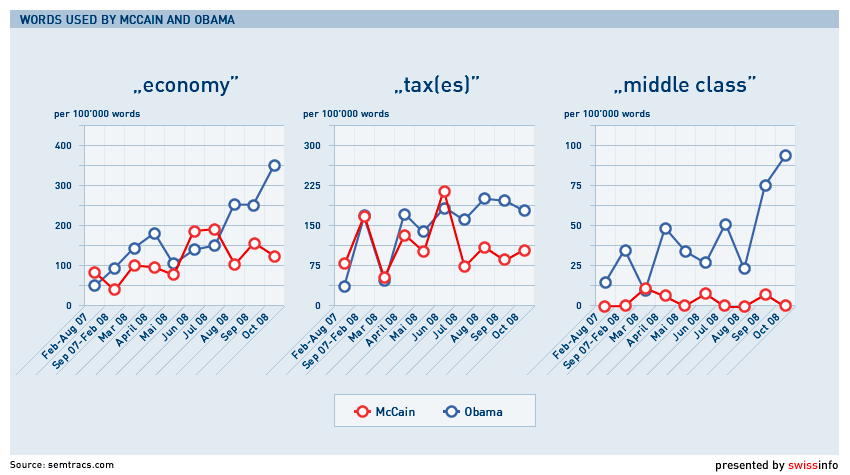
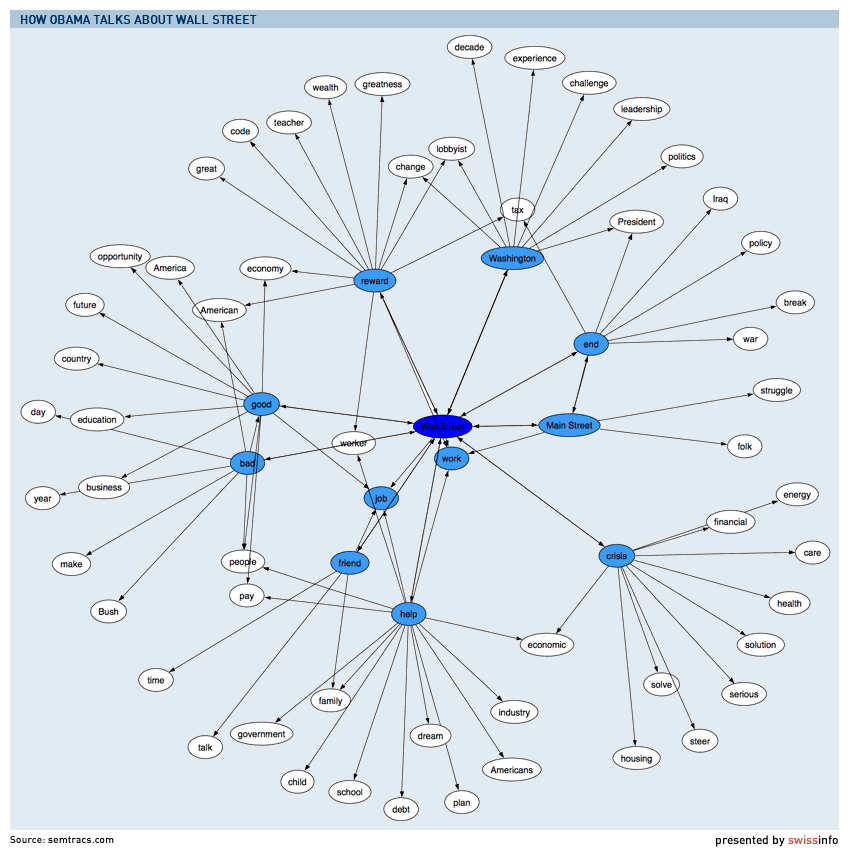


In compliance with the JTI standards
More: SWI swissinfo.ch certified by the Journalism Trust Initiative
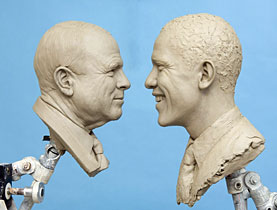

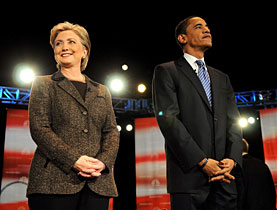
You can find an overview of ongoing debates with our journalists here . Please join us!
If you want to start a conversation about a topic raised in this article or want to report factual errors, email us at english@swissinfo.ch.